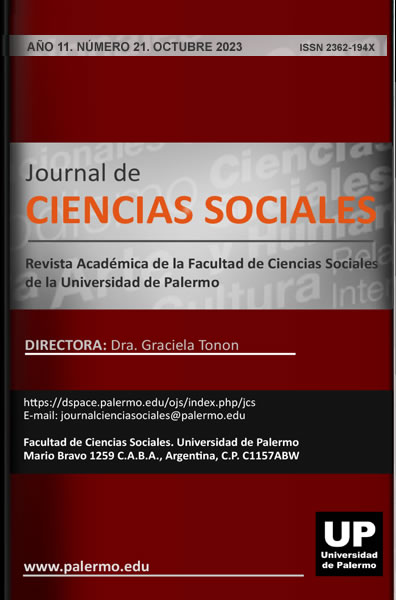The social interests of youth as a source of motivation in choosing a university career
Abstract
This essay is a reflection on youth, their intragenerational connections, and their perception of the society they live in. It emerges as a novel aspect in a Master's Thesis in Curriculum, defended in 2022 at the Faculty of Social Sciences of the Universidad Nacional de Lomas de Zamora (Buenos Aires, Argentina). This has been a qualitative and descriptive study that examined the part played by the education for the role of a technician in the Technical Degree in Childhood and Family Studies at the aforementioned institution. To achieve this, it was conducted a document analysis in which the opinions of the students were revealed. Reflecting on various aspects related to motivations for career choices, has led to the identification of three dimensions: personal experience as a source of motivation, promoting autonomy and empowerment, and assisting individuals in vulnerable situations. It is evident that the social interests of young students, in addition to their personal ones, influence decisions regarding a career and future profession. The expectation of working in the field they have chosen to study is associated with improving the quality of life and promoting societal change.
Downloads
References
Ajello, A. M. (2003). La motivación para aprender. En C. Pontecorvo (Coord.), Manual de psicología de la educación (pp. 251-271). Popular.
Barttolucci, J. (1994). Desigualdad social, educación superior y sociología en México. CESU-UNAM/Porrúa.
Burón, J. (2006). Motivación y aprendizaje. Ediciones Mensajero.
Cortada, N. (1984). El Profesor y la Orientación Vocacional. Trillas.
Feito, L. (2007). Vulnerabilidad. Anales del Sistema Sanitario de Navarra, 30(3), 7-22. https://doi.org/10.23938/ASSN.0199
García, B. (2003). Empoderamiento y autonomía de las mujeres en la investigación sociodemográfica actual. Estudios demográficos y urbanos, 18(2) 221-253. https://doi.org/10.24201/edu.v18i2.1162
Grzib, G. (2002). Bases cognitivas y conductuales de la motivación y emoción. Centro de Estudios Ramón Areces.
Guerra Ramírez, M. I. (2000). ¿Qué significa estudiar el bachillerato? La perspectiva de los jóvenes en diferentes contextos socioculturales Revista Mexicana de Investigación Educativa, 5(10), 205-242. https://www.comie.org.mx/revista/v2018/rmie/index.php/nrmie/article/view/996
Manassero, M., y Vázquez, A. (1998). Validación de una escala de motivación de logro. Psicothema, 10(2), 333-351. https://www.psicothema.com/pii?pii=169
Nussbaum,M. y Sen, A. (1993). The Quality of Life. Clarendon Press.
Ospina, H., Patiño, J., y Vega, M. (2012). Procesos de construcción e hibridación de las dientidades juveniles. En G. Tonon y S. Aragón (comps), Jóvenes ciudadanos: Experiencias de Participación en América Latina (pp. 213-256). Universidad Nacional de Lomas de Zamora.
Rivas, F. (1995). Manual de asesoramiento y orientación vocacional. Síntesis.
Santrock, J. (2002). Psicología de la educación. Mc Graw-Hill.
Silva, C., y Loreto Martínez, M. (2004). Empoderamiento: Proceso, Nivel y Contexto. Psyke, 13(2), 29-39. https://doi.org/10.4067/S0718-22282004000200003
Tonon, G., Rodríguez de la Vega, L., Meza, M., Savio, S. y Rinaldi, S. (2012). Calidad de vida e imágenes de futuro de jóvenes estudiantes universitarios. En G. Tonon y S. Aragon (Comps.-Eds.), Jóvenes ciudadanos: experiencias de participación en América Latina (pp. 13-42). Universidad Nacional de Lomas de Zamora.
Tonon, G., Savio, S. y Rodriguez de la Vega, L. (2011). Calidad de vida e imágenes de futurode jóvenes estudiantes universitarios. En del N. Rio Lugo y R. Fletes Corona, (Coord.), Los efectos de la crisis globalizada en los procesos de exclusión social de la infancia y juventud latinoamericana y del Caribe (pp.15-34). Universidad Autónoma Metropolitana-Xochimilco
Trost, G. (1993). Prediction of excellence in school, university and work. En Kurt Heller, F.Mönks, y A.H.Passow. (Eds.), International Handbook of research and development of giftedness and talent. Pergamon Press.
Vetorrazzi, L. P., Foresto, A., y Echeverría, H. D. (1996). Supuestos teóricos para el análisis de los aspectos motivacionales en la elección de una carrera universitaria. Universidad Nacional de Río Cuarto.
Otras fuentes consultadas
Instituto Nacional de Estadística y Censos (2003). ¿Qué es el Gran Buenos Aires? Disponible en el sitito web del INDEC, https://www.indec.gob.ar/dbindec/folleto_gba.pdf
Instituto Nacional de Estadística y Censos (2022). Censo Nacional de Población, Hogares y Viviendas 2022. Resultados provisionales. Disponible en https://www.indec.gob.ar/ftp/cuadros/poblacion/cnphv2022_resultados_provisionales.pdf
The authors retain the rights to their work guaranteeing this journal the right of first publication, committing to cite the Journal of Social Sciences as a reference of the original publication.
The works published in the Journal are published under the terms indicated in the Creative Commons License with the International Attribution 4.0 (CC BY 4.0).




























